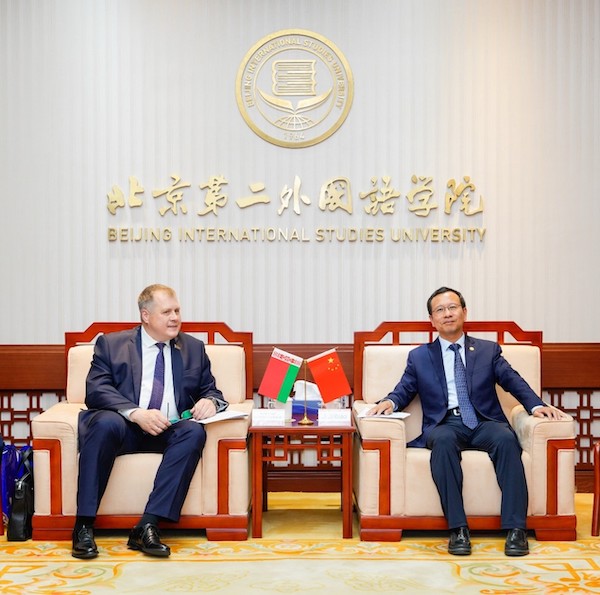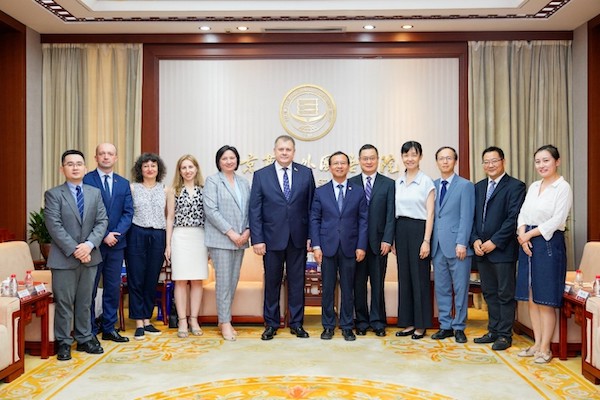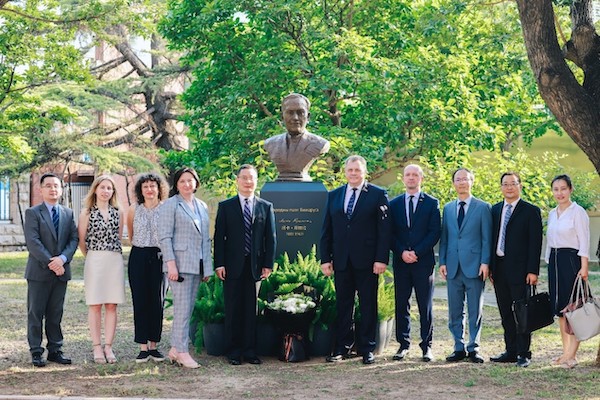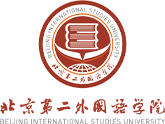
Belarusian First Deputy Minister of Education, Bakhanovich Alexander Gennadievich, paid a visit to Beijing International Studies University (BISU) on July 10, accompanied by Lapteva Natalia Evgenievna, president of Minsk State Linguistic University. The delegation was warmly received by Ji Jinbiao, deputy secretary of the CPC BISU Committee and president of the university, along with Zheng Chengjun, member of the Standing Committee of the CPC BISU Committee and vice-president of the university, as well as He Jing, assistant to the BISU president.

Ji Jinbiao (right), deputy secretary of the CPC BISU Committee and president of the university, meets Belarusian First Deputy Minister of Education Bakhanovich Alexander Gennadievich on July 10.
Ji extended a heartfelt welcome to Gennadievich and his delegation, and provided a comprehensive introduction to the rich history of the university, the wide array of foreign language programs, the university's steadfast commitment to internationalization, and its ongoing collaborations with esteemed Belarusian universities. He emphasized BISU's unwavering dedication to nurturing talents for foreign affairs and diplomacy. Over the past six decades, BISU has witnessed the emergence of an array of outstanding alumni, including Wang Yi, a member of the Standing Committee of the Political Bureau of the Communist Party of China Central Committee and director of the Office of the Foreign Affairs Commission of the Communist Party of China Central Committee.
Ji highlighted the remarkable depth and significance of the collaboration between BISU and Minsk State Linguistic University, which stands as a pioneering and most profound partnership among the five friendly Belarusian institutions with whom BISU has forged alliances. He underscored the paramount importance of vigorously promoting educational cooperation and facilitating two-way personnel exchanges, actively engaging in regional and country-specific research, and effectively amplifying the tangible outcomes of collaboration. Ji expressed unwavering confidence that this momentous meeting would chart the course for comprehensive and multi-level cooperation between the two universities in the foreseeable future.
Gennadievich expressed gratitude for the warm reception extended to him at the university. He appreciated the vigorous development of educational exchanges and cooperation between BISU and Belarusian institutions of higher education. He noted the positive trajectory of bilateral relations between China and Belarus, emphasizing the mutual significance attached to friendship and cooperation by the leaders of both countries. He emphasized that his visit would not only promote more substantial cooperation between BISU and Minsk State Linguistic University but also further enhance educational and cultural exchanges between the two nations, deepening the friendship between their peoples.
Evgenievna provided a brief summary of the existing cooperation between the two universities in the areas of Russian and Belarusian language teaching, master's programs, and comparative education. She fully recognized the achievements resulting from the collaboration thus far. She highlighted that the implementation of a four-year undergraduate system in Belarus from 2023 onwards would unlock greater potential for cooperation between the two universities in student and faculty exchanges, dual-degree programs, consecutive bachelor's and master's programs, and more. She suggested that the two universities could leverage joint research laboratories to conduct collaborative research, organize academic conferences, and advance digital teaching initiatives.

A group photo of the meeting
Zheng expressed his commitment to advancing educational cooperation between BISU and Belarus, as per Ji's guidance. He emphasized the need to strengthen exchanges in teaching, scientific research, and discipline development with Minsk State Linguistic University, while Xu Chuanhua, vice-dean of the School of European Studies at BISU, proposed cooperation in academic book translation. The parties reached a preliminary agreement on the proposals.
Accompanying the delegation's visit was Podkovyrov Aleksandr Sergeyevich, the first secretary of the Belarusian embassy in China. He expressed the embassy's high regard for the work of BISU's Belarusian Research Center and expressed anticipation for future visits by senior Belarusian delegations to the center.
Subsequently, Zheng accompanied the delegation on a visit to the university history museum, an observation of simultaneous interpretation classes, a tour of the Belarusian Research Center, and a visit to the statue of the renowned Belarusian poet Yanka Kupala on BISU campus.
During the simultaneous interpreting class, Han Xiaoye, head of the Russian Department at the School of European Studies, showcased a simulated international conference interpreting session for the Belarusian delegation. Han introduced the main content of the course and provided practical demonstrations of how interpreting techniques can be applied in practice. The class showcased the level of Russian interpreting teaching at BISU and the outstanding performance of the university's graduate students in live interpreting.
At the Belarusian Research Center, Director Xu introduced the center's history, functions, and recent achievements to the delegation. The Belarusian delegation voiced their appreciation the work of the center and presented a series of books as a gift. Both sides expressed their commitment to conducting joint Belarusian-related research work, utilizing the center as a platform.

The delegation pay their respects at the statue of the Belarusian national poet Yanka Kupala and present a floral tribute during the visit on July 10.
Yu Gang, director of the International Exchange and Cooperation Office, and Deputy Director Yan Hong, as well as other university officials, participated in the meeting.

Links
